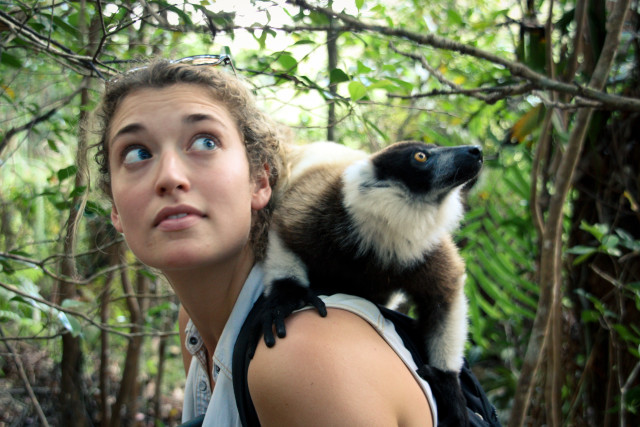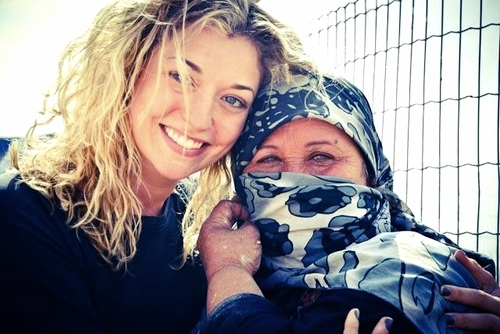
20 May Mountainfilm: Alize in Wonderland
Mountainfilm uses the power of film, art, and the exchange of ideas to inspire audiences to create a better world. Mountainfilm’s online schedule is now live, including times and venues for films, presentations, Moving Mountains Symposium about The New Normal, parties, Town Talks, book signings, special events, and more. Check out the Mountainfilm website for more.
A limited number of Palmyra passes are still available. Buy a Festival pass here now.
Remember to check the Festival Alerts page and download the festival app for up-to-date schedule changes and TBA information. Check out other Mountainfilm stories on Telluride Inside… and Out.
One of the featured speakers on the Symposium panel this year is Alizé Carrère, a dynamic young woman, writer, photographer, cultural anthropologist, who researches climate adaptations around the globe.
Alizé’s story is entitled “Alizé in Wonderland” because, for most of her life, the lady has lightly skipped down lots of rabbit holes to discover new and inspiring people and places.
Alizé’s film, “Adaptation Bangladesh: Sea Level Rise,” is scheduled to be screened on a program featuring entrepreneur-environmental activist and returning Mountainfilm guest, Paul Hawken. That no-miss event takes place Saturday, May 27, 12:15 p.m., at the Palm. “Bangladesh” screens again on Sunday, May 28, 3:45 p.m., at the Sheridan Opera House.
Alizé is also participating in a Town Talk on Monday, May 29, 8 p.m.
Scroll down to listen to Alizé’s podcast.

Alize & Lemur, courtesy, Nylon.
In 1798, Samuel Taylor Coleridge published his great cautionary tale: “The Rime of the Ancient Mariner”:
“The ice was here, the ice was there/ The ice was all around.”
In subsequent works by Mary Shelley, Edgar Allen Poe, Jules Verne, and Charles Dickens nature revealed its chilling to indifference to humanity.
That was then.
And this is now.
Proving once again the more things change, the less they change…
However, except in certain benighted halls – the usual suspects, the oil industry, the Forrest Trump White House – very few these days waste time and saliva trying to deny global warming. Disappearing islands, thawing permafrost, melting polar ice, record heat add up to the irrefutable fact of climate change and how it is changing the earth.
But what should we do about the crisis? Should we sit back feeling helpless and wring our hands for future generations?
Or should we carpe diem and attempt to change the game? Which is exactly the point of Mountainfilm’s initiative, The New Normal, and the subject of the upcoming Moving Mountains Symposium.
The New Normal is all about the power of one to make a difference.
Alizé Carrère – writer, photographer, cultural anthropologist, climate researcher, trip planner (for Lindblad Expeditions), adventurer, and National Geographic Explorer – is one of the dharma saints out to do just that, while finding others who refuse to take climate change lying down.
Alize is on a mission, constantly out in field, discovering innovative adaptations to global warming. To date, she has clocked 37 countries, 17 in the last year alone. Eat your heart out Energizer Bunny.
Alize is a featured presenters at Mountainfilm’s Moving Mountains Symposium. And her work the subject of a short film, part of a video series, “Adaptation Bangladesh: Sea Level Rise,” (directed by Justin DeShields), in which Alize shows us the kind of resilience, flexibility, and innovation that will be requisite for the survival of our species. (The short is scheduled to be shown Saturday, May 27, 12:15 at The Palm and Sunday, May 28, 3:45 p.m. at the Sheridan Opera House.)
”So much of the scientific documentation of climate change is focusing on how we’ve messed up – what went wrong. But let’s shift away from the doomsday narrative, because everybody is desensitized,” Alize said in an article in Nylon.
Alize’s goal is to change the conversation, to ask how we confront the issue at hand. Through a digital documentary series she is currently developing for National Geographic, Alize plans to answer questions such as “What do people means by ‘adapt’?” “What does adaptation look like?” “Who on the planet is doing it and how?”
Bottom line: Alizé is following in the footsteps of the charismatic entrepreneur-author-environmentalist Paul Hawken, a returning Mountainfilm guest speaking at the Symposium, who, in his book “Blessed Unrest,” (2007), captured a global movement of research institutes, community development agencies, village-and citizen-based organizations, corporations, networks, faith-based groups, trusts, foundations, and others, all trying to defend against corrupt politics, climate change, and other challenges.
“The great thing about the dilemma we’re in is that we get to re-imagine every single thing we do. In other words, there isn’t one single thing that we make that doesn’t require a complete remake. And so there are two ways of looking at that. One is like: ‘Oh my gosh what a big burden.’ The other way to look at it, which is the way I prefer, is: ‘What a great time to be born!’ ‘What a great time to be alive!’ Because this generation gets to essentially completely change this world,” Hawken told me in an interview in 2007.
The movement Hawken describes in “Blessed Unrest” is not about trying to save the world. He said it is all about “trying to remake the world.”
Alizé Carrère is a re-maker documenting other re-makers around the world.
It all began in 2012 when Carrere met a group of farmers in Madagascar, who figured out ways to farms in fields eroded by deforestation and heavy rains, having discovered that the gullies had become richer with water and nutrients.
From Madagascar it was on to Bangladesh, where rising waters are expected to displace 18 million people by 2050. In the southern district of Gopalganj, Alize witnessed people building floating gardens from water hyacinth, bamboo, and manure.
An architect transformed boats into floating school, hospitals, libraries, and playgrounds.
In India, she saw glacial melt is being repurposed to feed a desert ecosystem.
And the beat rolls on, Alizé Carrère following.
To learn more about her life and work, listen to my podcast with Alizé
More about Alizé Carrère:

Alize in the Negev Desert.
Raised in a treehouse in upstate New York, Alizé Carrère has a deep passion for adventure and the outdoors. After moving to Montreal to complete a B.A. at McGill University in Environmental Sciences and International Development, she spent time living in Panama before returning to McGill to complete an M.Sc. in Bioresource Engineering. During this time, she lived in the Middle East working on water resource management between Israel and Palestine.
In 2012, Alizé was named a National Geographic Young Explorer and received support to conduct fieldwork in Madagascar, where she spent several months uncovering an unlikely agricultural adaptation in response to severe deforestation. This set her on a path as a National Geographic Explorer, which has since brought her from the depths of the bush to high school classrooms and educational conferences, sharing stories from the field. With ongoing support from the National Geographic Society, she continues to spearhead field research on innovative adaptations to climate change, highlighting the remarkable resilience of the human species.
Most recently, Alizé has been working with Lindblad/National Geographic Expeditions, designing and leading itineraries aboard the National Geographic Orion around coastal Europe.


Sorry, the comment form is closed at this time.